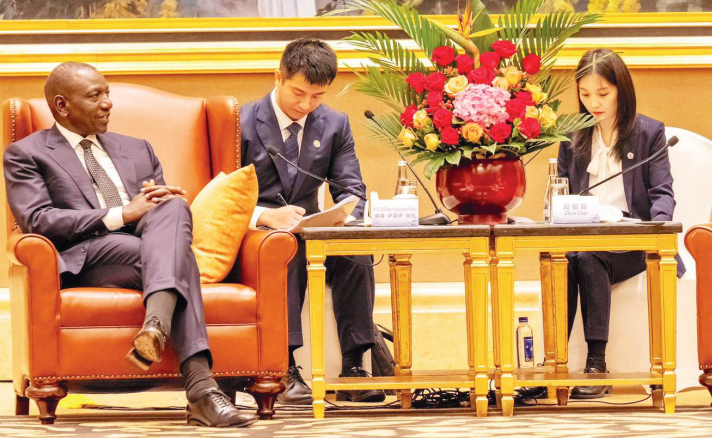

President Ruto's official visit to China will seemingly reintroduce Kenya–China diplomatic relations, which remain a foundational element of East Africa's global partnerships.
The presidential visit happens at a time when the geopolitical screenplay has significantly changed, rising debt concerns and a proliferated underlining on economic sovereignty.
Though this is President Ruto’s first State visit to China, it is his third since he took over, cementing the strong diplomatic relations between Kenya and China.
A state visit is a special visit compared to the other two. It also comes at a time when Kenya is weighing its options following US tariffs and foreign aid freeze.
During his state visit to China, President Ruto focused on debt restructuring, technology partnerships, infrastructure financing and expanded trade opportunities aligned with Kenya's Bottom-Up Economic Transformation Agenda (BETA).
Post-Covid, China refocused its global posture on smaller impactful initiatives while adopting a conservative lending approach, which supports Kenya's efforts for value creation and digital transformation and local economic development.
The visit signifies how Kenya maintains its geopolitical position as it actively navigates through longstanding ties with Beijing while advancing partnerships with Western countries.
This engagement surpasses conventional protocol because it occurs during critical periods of economic progress, climate crises as well as security upheavals in the Horn of Africa region.
This visit potentially defines how China and Kenya will collaborate in the foreseeable future.
For proper Historical Context, China declared Kenya a sovereign state and established official diplomatic ties soon after Kenya’s independence to become one of the first four nations to do so.
It displayed ideological support towards Kenya's independence by backing its post-colonial identity through establishing modest trade and cultural engagements during the Cold War period.
The relationship between China and Kenya underwent its first major breakthrough in the 1980s when China’s market dynamics reformed and Kenya adjusted to convert ideological solidarity into economic collaborations, benefiting both nations.
President Moi strengthened diplomatic relations with Beijing through multiple state trips from the 1980s through the 1990s, and in the process secured Chinese technical assistance to upgrade agriculture projects alongside building infrastructure.
Under President Kibaki's leadership (2002-2013), the "look East" policy prioritised Chinese engagements, leading to major infrastructure financing that produced the Thika Superhighway as an emblematic project for this new Chinese development era.
President Uhuru Kenyatta led Kenya to quick adoption of China's Belt and Road Initiative during his presidency from 2013 to 2022, thus securing major financing for megaprojects such as the Standard Gauge Railway, which is presently the country's biggest infrastructure investment ever.
This period, however, brought forward disputed elements of their relationship, such as huge debt accumulation.
The economic dimension of Kenya-China relations has become the cornerstone of bilateral engagement, with China remaining Kenya's largest bilateral trading partner for the past eight years, despite persistent imbalances that benefit Chinese exporters.
Chinese imports to Kenya, spanning from machinery and electronics to consumer goods, closed at USD6.7 billion in 2024, yet Kenyan exports to China, mainly agricultural items such as tea, coffee and avocados, amounted to just USD1.5 billion, which creates a continuous trade deficit that worries Kenyan policymakers and business executives.
China leads as Kenya's biggest bilateral creditor, following loans estimated at USD7.1 billion in January 2025 that consume 19 per cent of external debt assets and generate major payment commitments which strain Kenyan budget funds against currency exchange rate fluctuations and global economic unpredictability.
Kenya considers its Standard Gauge Railway as the main outcome of Chinese investment, but doubts about its profitability after missing pre-planned revenue targets.
Additionally, the country built several large-scale infrastructure projects such as the Nairobi Expressway (USD668 million) and the Lamu Port (USD3.5 billion) alongside multiple power generation initiatives, which boosted Kenya's electricity supply by 45 per cent during the last ten years.
Major road construction contracts in Kenya from 2013 until 2024 have gone primarily to Chinese companies, who obtained 72 per cent of the available contracts while establishing manufacturing operations that created an estimated 37,000 Kenyan jobs through their industrial parks in Machakos, Naivasha, and Kisumu.
Tech giants Huawei and Alibaba, along with other firms, aggregate the largest growth rate in Kenya-China economic cooperation through investments that have built Kenya's digital infrastructure while transforming its technology ecosystem.
The China-Africa Development Fund created a USD400 million facility to support Kenyan entrepreneurs and joint venture partners who want to build better economic benefits for local communities.
Modernisation initiatives in agriculture have intensified in current times as China supports the construction of irrigation systems covering 50,000 hectares while offering expertise that has raised cultivation yields of rice and aquaculture and greenhouse operations throughout different Kenyan regions.
While China's economic engagement has resulted in tangible infrastructure improvements and technological advancement, persistent challenges include concerns about debt sustainability, limited technology transfer, market access restrictions for Kenyan products in China, and the environmental impact of Chinese-backed projects, which are still being negotiated between the two governments.
During this visit, Kenya signed seven deals worth USD823 million, among them the construction of Special Economic Zones in Kikambala with a potential to employ about 5,000 people worth USD150 million and a Godown project to set up manufacturing factories for textile, garment, solar power in Murangá valued at USD20 million.
The investors will put in about 300m USD in a span of 10 years into this project. Other deals are in steel manufacturing, chicken farming, smart transportation agriculture and hospitality.
Twenty six more deals were signed, including MoU to unlock job opportunities in Blue Economy, Intelligent Traffic Management System, Tech and Innovation, Human Capital Uplift, Cultural Exchange, Skills for the Future, Digital Economy Upgrade, Broadcast Innovation among others.
Geopolitically, Kenya plays an important role in China's Africa strategy because of its status as East Africa's largest economy, its strategic location providing access to the Indian Ocean, and its influence in regional organisations such as the East African Community and the African Union, which extend China's diplomatic reach across the continent.
China developed a meticulous strategy for Kenya as part of its multi-faceted approach to obtain natural resources, new market opportunities and diplomatic backing at the United Nations on pressing issues like Taiwan status and human rights resolutions where Kenya aligns with China.
The Chinese naval operational expansion in the Indian Ocean through their Djibouti base in 2017 made Kenya an essential country for the Maritime Silk Road project to safeguard maritime shipping routes and expand Chinese influence throughout the Indo-Pacific region.
Western countries, including the US and EU, have increased their diplomatic initiative in response to China's growing influence in Kenya by offering more development support through U.S. International Development Finance Corporation initiatives and expressing debt-trap fears.
Kenya's balancing act between Chinese investment and Western security partnerships has become difficult, especially as the country maintains its status as a major non-NATO ally of the United States while hosting Chinese-built and financed critical infrastructure that raises potential security concerns among Western intelligence agencies.
Kenya-China relations through maritime security cooperation have become critical since China trains and supplies equipment to the Kenyan Navy and enlarges its naval operations in the western Indian Ocean, which appears aimed at piracy control but imposes a new military order on the region.
China relies on peaceful and stable conditions in Kenya because its large-scale business activities across the Horn of Africa require dependable support from both South Sudan's energy sector and Ethiopia's infrastructure development.
The timing of this visit is especially significant because it coincides with Kenya's efforts to address a challenging fiscal situation, with public debt reaching 67% of GDP and the country seeking to renegotiate terms with various international creditors while simultaneously pursuing new investment to stimulate economic growth amid global economic uncertainty.
Chinese Foreign Ministry spokesperson Lin Jian declared that Beijing and Nairobi will work together to advance their partnership status to "comprehensive strategic partnership of cooperation”.
The restructuring of Kenya's current Chinese debt takes priority at the bilateral meetings, specifically targeting the expensive Standard Gauge Railway loan costs, which strain Kenya's finances beyond its ability to fund development projects.
The Chinese government intends to initiate new financing deals worth $2 billion to finish building the northern segment of the Standard Gauge Railway through Uganda. The visit envisages technology cooperation as its central point.
A key objective of the Kenyan delegation during the trade talks also includes obtaining better market entry for agricultural goods through Chinese reforms regarding non-tariff regulations and streamlined documentation processes and established trade preferences designed to disrupt the long-lasting Chinese market dominance.
President Ruto has publicly stated that he intends to pursue “a more balanced relationship with China than his predecessors,” emphasising private sector involvement, technology transfer, and manufacturing capacity rather than focusing solely on debt-financed infrastructure, as previous administrations have.
President Ruto believes Kenya and China are “co-architects of a new world order- one that is fair, inclusive sustainable.”
Under President Ruto, Kenya shows the intention to sustain economic relations with China while pursuing better terms that promise mutual advantages that match Kenya's developmental demands and financial conditions.
The collaboration on climate change is an emerging area for mutual growth in diplomatic relations because China leads renewable energy technology, while Kenya pursues its objective to transition fully into clean power by 2030 and become a regional centre for eco-friendly technologies and practices.
Digital economy cooperation will probably intensify as Kenya strives to become Africa's technological hub, "Silicon Savannah", since Chinese technology firms want to increase their African presence with the possibility of forming beneficial partnerships between Kenyan innovators and larger markets, provided proper rules exist for intellectual property protection and data management.
The agricultural sector of Kenya targets new Chinese investments in processing plants to upgrade its raw exports into valuable products and solve the problems of food security by developing better farming approaches and storage systems.
The positioning of Kenya within the African Continental Free Trade Area will improve its appeal for Chinese investors who want to access Africa's 1.3 billion consumers and thereby reduce trans actionality toward sustainable economic partnerships.
Seemingly, security cooperation between China and Kenya will move away from its traditional boundaries into new threat areas, including cybersecurity and counterterrorism, and maritime domain awareness, because both nations share similar security concerns for East African and Indian Ocean economic interests.
The debt question will shape bilateral ties as Kenya focuses on seeking debt restructuring and chooses new borrowed funds that include grant elements and private sector partnerships with suitable financial parameters for fiscal sustainability. competition.
The outcomes from this high-level visit will denote the future relationship architecture between these countries as well as show if it can adjust to a mutually beneficial alignment that supports Kenya's developmental goals with China's strategic objectives in today's multipolar ecosystem.

















